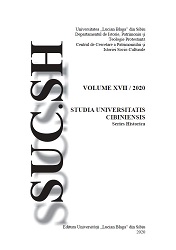The Hidden Tragedy (June 13, 1941 in the Fate of the Inhabitants of the Danube Region)
The Hidden Tragedy (June 13, 1941 in the Fate of the Inhabitants of the Danube Region)
Author(s): Liliya TsyganenkoSubject(s): History, Recent History (1900 till today)
Published by: Editura Universitatii LUCIAN BLAGA din Sibiu
Keywords: Ukrainian Transdanubia region; Southern Bessarabia; repressions; deportations; sweeping borders; “enemies of the people”;
Summary/Abstract: The events related to the establishment of Soviet power in the Ukrainian Transdanubia region in June 1940 – June 1941 are considered. The arrival of the Soviets on the land of the region turned out to be a fundamental change in the sustainable life of the local population. To consolidate communist power in the Danube River, the Stalinist regime used the existing “experience” which had been accumulated by the system in previous years. Moreover, the “love of advice” had to be knocked out by force, because the communist ideology was not particularly popular in the region. Taking into consideration the proximity to the border, the long stay of the region under the authority of the Romanian administration, the Soviet punitive authorities began a large-scale operation to “clean the territories of undesirable elements” at the end of June 1940. This category included all those who collaborated with the Romanian authorities, as well as individual peasants, owners of workshops and factories, shops and restaurants, pharmacies and residential buildings. People fell into the hands of the Soviet punitive machine, regardless of ageand gender, nationality and religion, level of education and profession. Among the representatives of ethnic minorities, the most affected (according to the author) were Jews, Romanians, Ukrainians, Bulgarians and others. Arrests and exile took place in several stages, but the most significant events occurred on June 13, 1941, when during one night in Southern Bessarabia nearly 1,500 thousand people were repressed (the author has archival documents for each name). For many, the“acquaintance” with the NKVD bodies ended tragically – arrests and prison sentences, confiscation of property and deportations, departure to the “labor front”to Siberia, Central Asia. Many of those who were repressed in their time did not return home alive. The modern Ukrainian state has set before civil society the task of naming everyone who has been repressed illegally. Today we have to perpetuate the memory of our compatriots who have been victims of political repression, to bring that memory to future generations and to never allow the horrors of totalitarian regimes to be repeated.
Journal: Studia Universitatis Cibiniensis. Series Historica
- Issue Year: 2020
- Issue No: XVII
- Page Range: 259 - 273
- Page Count: 15
- Language: English
- Content File-PDF

